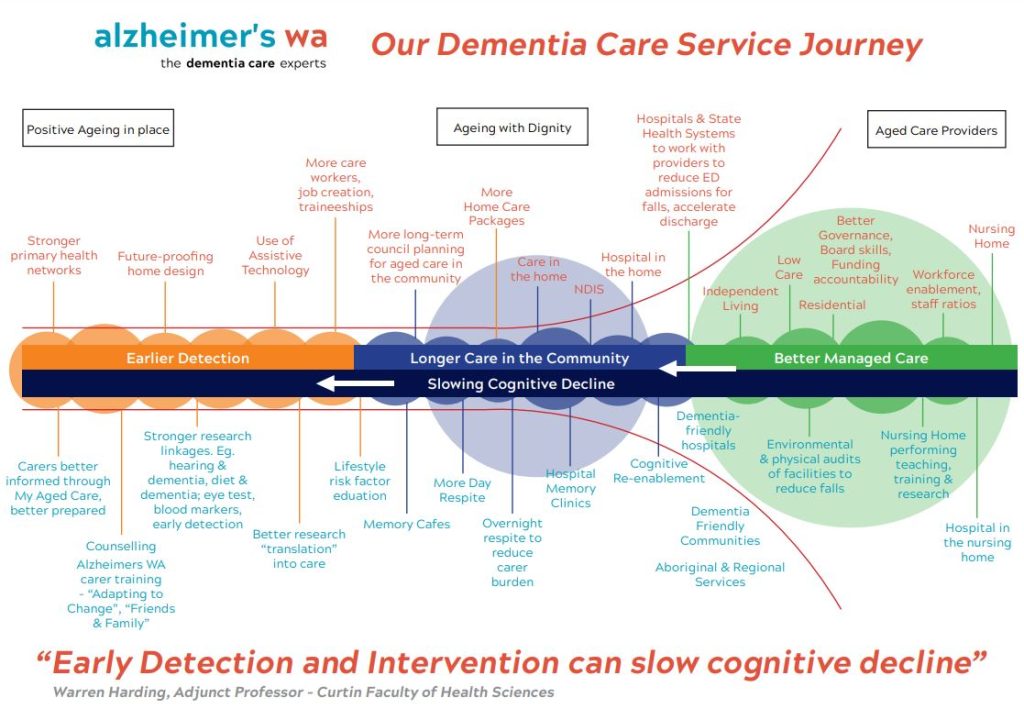Today the Care, Tomorrow the Cure
Dementia research translation into new models of care is a key element of Alzheimer’s WA’s mission and the focus of its Research and Partnership program. We have a strong commitment to supporting dementia research and to advance the understanding of best practice dementia care for Alzheimer’s Disease (AD). Through donations we receive, we contribute project funding to support researchers in exploring early detection, early intervention, lifestyle prevention, treatment and cure for dementia.
We also engage in, and encourage our members to participate in, research trials to further our knowledge and develop evidence for best practice through partnerships with research institutions. These partnerships currently include collaborations with local, national and international researchers and universities.

Prevention of AD with lifestyle measures remains just as important as ever. Improvement in the understanding of risk factors combined with screening and early detection will support early intervention and earlier access to Alzheimer’s WA counselling, memory cafés and respite services. Lifestyle modification to reduce risk of cognitive decline is still highly encouraged on the basis of earlier trials such as the Finnish Geriatric Intervention Study to Prevent Cognitive Impairment and Disability (FINGER). Similar trials are underway worldwide, including the AU – ARROW study which is recruiting in Perth.
Alzheimer’s WA provides information to its members and dementia advocates’ network on the latest research trials taking place and raises awareness of opportunities to participate in research studies being undertaken. Involving people living with dementia either directly or indirectly in the research programs is a key priority for us.
How to participate in a trial
Dementia is the leading cause of death for women and the second commonest cause of death in Australia and is becoming increasingly common in low and middle income countries. Making progress in treatment and prevention relies on people taking part in clinical trials, including healthy cognitively unimpaired as well as PLWD.
Alzheimer’s WA is pleased to be partnering with the University of Sydney in developing a new way for people to participate in dementia research. The StepUp program allows people living with dementia, carers, family and the general public to register their interest in volunteering for research projects in dementia treatment and care.
The Australian Dementia Network helps link clinicians, researchers and consumers to improve the diagnosis and treatment of dementia as well as enabling screening of people to participate in trials. The Step up for Dementia initiative enables people to directly volunteer for trials.
If you would like to view more information please visit the StepUp for Dementia Research website: https://www.stepupfordementiaresearch.org.au
A new international study about reading and music to help with behaviours associated with dementia, which has ethics approvals, can be found at
Australia — Homeside – Partnership in dementia care (homesidestudy.eu)
Call for participants in a new sleep intervention workshop for dementia carers
Are you a Dementia Carer who could be sleeping better? Are you often awake ruminating and worrying?
Dr. Aisling Smyth, a researcher based at the School of Nursing, Edith Cowan University is evaluating a sleep promoting intervention to see if we can improve the sleep of dementia caregivers.
The ECU ‘Sleeping Better Program’ is an interactive, four weekly workshop (once a week, for four weeks in March), delivered by post-graduate clinical psychology interns under the supervision of a Clinical Psychologist at ECU Psychological Services Centre in Wanneroo, WA 6065. Whilst your overnight sleep may be interrupted by caregiving, our aim is to optimise the sleep that you can get.
In order to participate you must:
1. Be an informal caregiver of a community dwelling person living with dementia
2. Self-identify as a poor sleeper
3. Have no known diagnosis of sleep apnoea or a sleep disorder
4. Not take sleeping medication more than once per week regularly
If you are interested and would like more information, please email aisling.smyth@ecu.edu.au or call.
Leave your details at the link below and she will get in touch: https://eaecu.au1.qualtrics.com/jfe/form/SV_a90TaMtwww7a5N4
This study has been approved by the Edith Cowan University Human Research Ethics Committee. If you would like more information please contact Aisling or Warren Harding, Chair Alzheimer’s WA and Head of Research and Partnerships on 0401 491 110.
Alzheimer’s research highlights
Amyloid is considered to lead to the formation of phosphorylated tau protein, tangles, neuronal loss and cognitive impairment. Neuroinflammation is thought to drive this process and increasing evidence supports the involvement of the native immune cells in the brain, the microglia, as major players.
The most interesting development in Alzheimer’s Disease research and treatment is the decision by the US Food and Drug Administration (FDA) in June 2021 to approve aducanumab (marketed as “Aduhelm”), an antibody directed against beta amyloid (Aβ) for clinical use. It has been heralded as a major advance, a disease modifying therapy that removes Aβ from the brain- the first new therapy in decades which gives the pharmaceutical industry confidence to continue to pursue other therapies.
The source of Aβ has been presumed to be from the brain. However, recent work from Curtin University researchers suggest that much of it may be derived from the liver and delivered to the brain via lipoproteins increased by a diet high in saturated fat. They used transgenic mice who make more amyloid precursor protein but only in the liver and not brain. These mice displayed damage to brain capillaries and the blood brain barrier, allowing leakage of Aβ and lipoprotein into the brain. This highlights the importance of diet. A trial ia now underway to use probucol, (a drug previously used to treat cholesterol which may protect brain capillaries and the blood brain barrier) in people with mild AD (PIA study). More information on how to participate in this Curtin trial can be found at https://www.piastudy.com.au
Progress is also being made with new blood tests for p-tau-217 which would be accurate enough to act as a diagnostic test for AD. Further work is required to enable reliable “cut-off” levels to reliably detect people in the pre-symptomatic phase, when therapies are likely to have the most benefit. Hence, designing risk prediction algorithms that combine blood tests with other markers of risk is underway and promising.
We are fortunate in WA to have access to participation in both Australian and International trials in Perth via a number of sites including the Australian Alzheimer’s Research Foundation (AARF) and further information on the trials they are running currently can be found at:
Alzheimer’s WA is also pleased to be partnering with Notre Dame University on anterior and posterior eye tests for the early detection of amyloid protein.
Research Partnerships
Our dementia care expertise can be a valuable contribution to research projects. Our staff, clients and families may provide reference group membership or associate investigator/chief investigator roles to strengthen the collaboration in projects.
Our research partnerships include:
If you would like to discuss a research partnership with Alzheimer’s WA, please contact:
Warren Harding – Chair & Head of Research and Partnerships on 0401491110.
Alzheimer’s WA acknowledges the expertise and contribution of our Honorary Medical Officer and Board Director, Dr Sean Maher, Geriatrician.
Participating in a Dementia Trial in Perth
Advances in dementia care are only possible because altruistic people are willing to participate in trials. This includes well, cognitively intact people, people at risk of dementia, people with symptoms who might have the early stages of dementia, as well as people living with dementia and very importantly, their carers.
Step up for Dementia Research
The StepUp program allows people living with dementia, carers, family and the general public to register their interest in volunteering for research projects in dementia treatment and care. It allows researchers to find people who fit the criteria to be involved in a study, as well as allowing people volunteering to indicate what sort of studies they might consider.
https://www.stepupfordementiaresearch.org.au
We are fortunate to have access to participation in Australian and International at the Australian Alzheimer’s Research Foundation (AARF). Further information on current trials can be found at:
Probucol in Alzheimer’s Disease Study
This study uses a cholesterol-lowering medication which has also been shown to have anti-inflammatory and anti-oxidant properties. It reduces production of beta amyloid together with fat molecules in the gut in mice and seems to reduce the risk of the mice getting Alzheimer’s Disease. More information on how to participate in this Curtin University trial can be found at:
A new international study about the effects of reading and music to help with behaviours associated with dementia can be found at:
Australia — Homeside – Partnership in dementia care (homesidestudy.eu)
If you would like further information on how to participate in a dementia trial, please contact: Warren Harding – Chair & Head of Research and Partnerships on 0401491110.

 Listen to this page
Listen to this page
